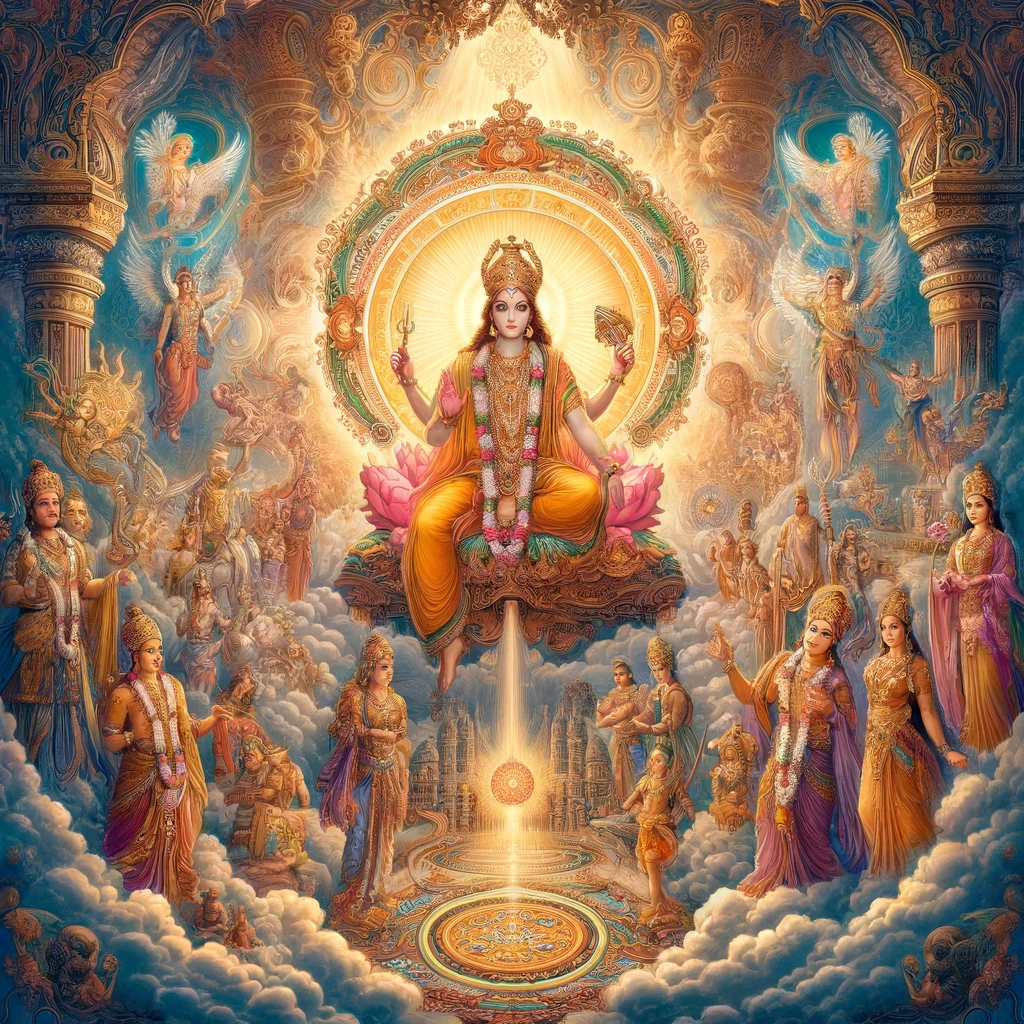ಅಮೃತಾಂಶೂದ್ಭವಃ ಭಾನುಃ ಶಶಬಿಂದುಃ ಸುರೇಶ್ವರಃ
ಔಷಧಂ ಜಗತಃ ಸೇತುಃ ಸತ್ಯಧರ್ಮಪರಾಕ್ರಮಃ || 31 ||
amṛtāṃśūdbhavaḥ bhānuḥ śaśabiṃduḥ sureśvaraḥ
auṣadhaṃ jagataḥ setuḥ satyadharmaparākramaḥ || 31 ||
amṛtāṃśūdbhavaḥ (ಅಮೃತಾಂಶೂದ್ಭವಃ)
"Amritamshu" refers to the moon with rays of nectar. The power that created the moon as "Amritamshu" is known as "Amritamshu-udbhavah." According to mythology, when the sage Atri and his wife Anusuya prayed for children who would be incarnations of the Trimurtis (Brahma, Vishnu, and Shiva). Narayana (Vishnu) was born as Lord Datta, while Lord Shiva was born as Lord Durvasa. Lord Brahma cannot incarnate on earth. For this reason, the Lord incarnates as Soma (the moon) and resides within it, being born in the lineage of Atri. "Dattatreya" means Datta, Durvasa, and Soma.
In another sense, "Amritaru" refers to those who are free from death, the liberated souls who are free from the cycle of birth and death. The Lord, in the form of "Amritamshu-udbhavah," ಅಮೃತಾಂಶೂದ್ಭವಃ grants these liberated souls a higher state beyond the cycle of birth and death.
bhānuḥ (ಭಾನುಃ)
'Bha' means knowledge, light, joy, etc. Whoever possesses all the knowledge and joys present in the world is called 'Bhanu.' He is the illuminator of the world, present in the sun, and resides in the rays of the sun. Bhagavan is 'Bhanu' in this sense.
śaśabiṃduḥ (ಶಶಬಿಂದುಃ)
In general terms, 'Shashabindu' means 'Rabbits Drop.' It doesn't specify any particular meaning. When Lord Sri Rama was in the forest, he hunts a Rabbit. A drop of blood from the Rabbit falls on Lord Sri Rama, drenched with a drop of Rabbits blood Sri Rama was called ‘śaśabiṃduḥ’ is the meaning at superficial level. However, there is a deeper and more profound meaning to this name. 'Shasha' means bliss or great joy, and 'bindu' means point or source. Bhagavan, whose entire being is filled with boundless joy, is called 'Shashabindu' as he leads us to the state of supreme bliss.
sureśvaraḥ (ಸುರೇಶ್ವರಃ)
Those who guide us, perform righteous deeds within us, and lead us towards upliftment are known as ‘Suraru.’ The Supreme Lord who controls all the deities that regulate our senses is known as ‘Sureshwara.’ To receive happiness from deities, we need both our own actions' results and the grace of the Supreme Lord. No celestial bodies or deities cause us trouble. Our planetary fate is determined based on our actions (karma). Some people are told by astrologers that they are troubled by Saturn (Shani Kata). But no deities give us trouble and punishment. Planetary movements merely indicate our past karma. The Supreme Lord of all gods is the thread of everything that controls us. Our life is like a drama, and here we are the 'actors.' This drama unfolds according to the rules set by the director. Our duty is to play the role given to us in the director's script, following the rules of the director's guidance. Understanding this, if we live, we can fully enjoy our lives. Sun who controls us is controlled by Brahma, Rudra, Sesha, Garuda and other deities who are higher in order to Sun. God controls these higher deities. We experience happiness and sorrow, and all of it is a part of God's teaching process. The one who allows us to perform, performs, and accepts our offering is sureśvaraḥ. In the Bhagavad Gita, the Lord Himself has spoken these words. "ಅಹಂ ಹಿ ಸರ್ವ ಯಜ್ಞಾನಾಂ ಭೋಕ್ತಾ ಚ ಪ್ರಭುರೇವ ಚ" (ಅ-೯, ಶ್ಲೊ-೨೪) "ahaṃ hi sarva yajñānāṃ bhoktā ca prabhureva ca" (9.24). Thus, being the Lord of all, including Brahma and other deities, and the Ishwara (controller) of everyone's happiness, Lord Bhagavan is known as Surreshwara.
auṣadhaṃ (ಔಷಧಂ)
Throughout the entire universe, for all diseases, the fundamental remedy is the Lord, who is the ultimate cure for the ailment of samsara (cycle of birth and death). He is the physician for the disease of worldly existence. He is the healer, and He is the medicine itself! When you analyze this name, it consists of 'Ausha' + 'Dha.' Here, 'Ausha' means something that burns or heats up, signifying the intense suffering in the cycle of worldly existence. 'Dha' means the one who protects or bestows blessings. 'Aushadha' means the divine healer who protects and provides solace to those who are engulfed in the ocean of samsara.
jagataḥ setuḥ (ಜಗತಃ ಸೇತುಃ)
The Lord is the bridge that leads from the world to liberation, the bridge that encompasses the entire world. He is the One who is both the means and the ultimate goal. He is the bridge and the destination beyond. 'Sethu' means the power that binds. He is the One who binds us in the bondage of worldly existence, and He is also the bridge to cross the ocean of samsara. Once we have crossed, the ultimate destination to reach is also Him. Such is the Lord, the bridge encompassing the entire world, Jagatah Sethuh.
satyadharmaparākramaḥ (ಸತ್ಯಧರ್ಮಪರಾಕ್ರಮಃ)
In the Lord, two main qualities are described: Dharma (righteousness) and Paraakrama (valor). Here, Dharma refers to the power of sustaining or upholding righteousness. The ability to nullify evil forces is Paraakrama. Since the Lord's glory is genuine, He is called Satyadharma-Paraakrama. The Lord is the embodiment of Truth, the ultimate cause and creator of the universe. He imparts knowledge to us. As mentioned in the Bhagavatam, 'Satyam Jnanam Anantam Brahma Satyam Param Dheemahi,' meaning, 'I meditate upon the Truth, Knowledge, and the Infinite, which is the Supreme Reality, the Supreme Intelligence.' The Lord, named Satya, bestows knowledge, which is a form of valor, to His devoted followers and combats against injustice. He is Satyadharma-Paraakrama.


